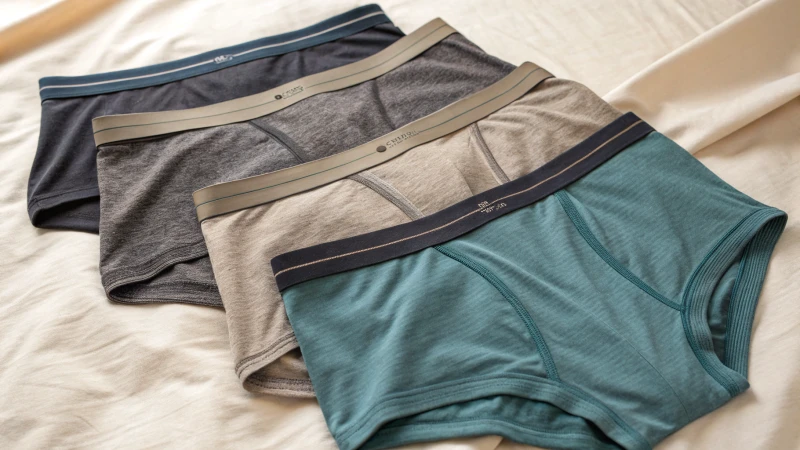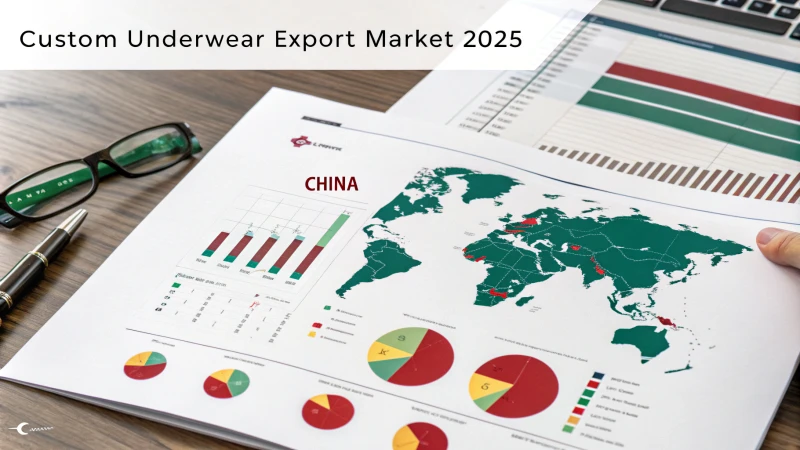
Curious about who might rule the custom underwear market by 2025?
China probably stays on top in the custom underwear export market in 2025. Its vast manufacturing power and smart pricing keep it competitive. China has a strong foundation and skilled workers. This country holds a strong position to lead.
However, I wonder if China's dominance will continue indefinitely. Many people once believed a certain brand would always lead, yet it was eventually surpassed by creative newcomers. Let's explore the custom underwear export market. Who are the rising stars there? They might truly change the scene.
China will lose its lead in custom underwear by 2025.False
China's infrastructure and workforce are expected to maintain its lead.
Emerging markets may challenge China's dominance by 2025.True
Emerging markets are growing, potentially disrupting China's stronghold.
What Makes China a Dominant Player in the Custom Underwear Market?
Do you ever think about why China is the leader in custom underwear production?
China leads the custom underwear market due to its large manufacturing facilities, experienced workers and low-cost production methods. This allows China to create high-quality, customizable products in large quantities. The country's strong position in this market is notable.
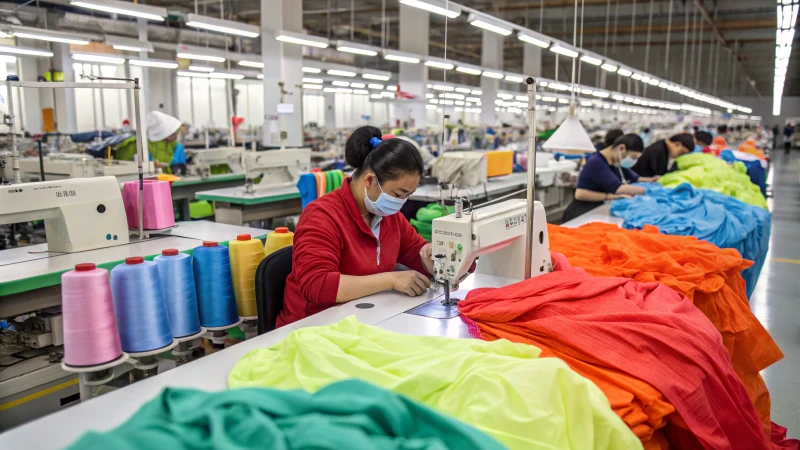
Strong Manufacturing System
China's wide network of factories and suppliers helps anyone produce custom underwear1 on a large scale. The ability to quickly increase production for big brands impresses everyone.
Manufacturing Advantages
| Feature | Description |
|---|---|
| Scale | Ability to produce large quantities efficiently. |
| Flexibility | Quick adaptation to design changes and trends. |
| Integration | Complete supply chain from raw material to finished product. |
Skilled Workers
I once talked with an old textile worker during a visit. He shared how he learned complex stitching skills passed down from his ancestors. Such deep experience is key to success in custom manufacturing2.
- Training Programs: Workers learn to handle detailed designs and fabrics.
- Quality Control: Thorough checks confirm products reach high standards.
Affordable Prices
While discussing with manufacturers, I noticed how China offered low-cost solutions3. The mix of cheap labor and smart production techniques draws global brands.
Cost Factors
| Factor | Impact on Price |
|---|---|
| Labor Costs | Lower wages reduce overall expenses. |
| Material Sourcing | Local availability cuts transportation costs. |
| Efficient Logistics | Streamlined processes lower delays and costs. |
Innovation and Customization Skills
Chinese manufacturers turn imaginative ideas into reality. I saw a product go from an idea to a sample very quickly, thanks to modern machines and design methods.
- Fast Prototyping: Rapid sample creation allows brands to change designs quickly.
- Tech Integration: Advanced machines improve customization with bespoke design solutions4.
These experiences explain why China excels in the custom underwear market, offering an attractive choice for brands wanting unique, top-quality products everywhere.
China has the largest custom underwear factories.True
China's vast manufacturing infrastructure supports large-scale production.
Chinese labor costs are higher than in Europe.False
China's lower labor costs contribute to competitive pricing.
Which Emerging Markets Could Challenge China's Leadership?
Picture finding the next major force in the world economy - what if it might challenge China?
India, Vietnam and Brazil are strong contenders against China's economic strength. Their populations are increasing and hold promise. Strategic changes are happening. Industries are growing fast.

India's Growing Promise
I often remember my trip to India, which showed me its huge potential. The buzz in its cities felt contagious. With a fast-growing population and a rising middle class, India has vast consumer markets. Economic reforms and programs like "Make in India" open doors for more manufacturing and infrastructure work. This situation attracts investors searching for new opportunities.
- Key Industries: Information technology, pharmaceuticals, textiles.
- Advantages: Young workforce, democratic governance.
India's Economic Growth5 stands as a key driver, likely drawing in investors wanting options beyond China.
Vietnam's Manufacturing Surge
A friend of mine moved his supply operations to Vietnam. Why? Its booming manufacturing sector is the reason. Vietnam positions itself smartly as a manufacturing leader, thriving from the U.S.-China trade tensions6. Its young workers, low labor costs and strategic spot lure businesses wishing to spread their supply chains.
- Key Industries: Electronics, textiles, footwear.
- Advantages: Favorable trade agreements, political stability.
Vietnam's industrial policies7 continue attracting foreign investors, making it a strong competitor.
Brazil's Natural Wealth
During my college years, Brazil frequently popped up in discussions on natural treasures. Its vast resources and robust agriculture sector form a solid base for economic growth. Standing as South America's largest economy, Brazil moves toward enhancing its business environment and reducing reliance on commodities.
| Sector | Strength |
|---|---|
| Agriculture | Coffee, soybeans |
| Energy | Oil, biofuels |
Exploring Brazil's Economic Future8 shows its potential to become a global power.
Evaluating Challenges Ahead
While prospects seem bright, each country faces its hurdles - whether it is infrastructure gaps, tricky regulations or political uncertainties. These issues remind me of times I have weighed risks against rewards in my own projects. Investors must weigh these factors carefully when evaluating these markets.
Challenging China's leadership presents a complex journey filled with obstacles. Economic analyses9 provide valuable insights into these dynamics and guide strategic investments.
India's economic growth is driven by its IT sector.True
India's IT sector is a major contributor to its economic expansion.
Vietnam's political instability deters foreign investment.False
Vietnam is politically stable, attracting foreign investors.
How Are Technological Advancements Shaping the Future of Underwear Manufacturing?
Picture the world of making underwear. Now, technology shapes every stitch and seam. The industry is at the front of new ideas. This change is really fascinating to me.
Technological progress in underwear manufacturing uses smart fabrics, AI-driven design and sustainable methods. These changes offer more personalized options, improved efficiency and match people's desire for eco-friendly products. Eco-friendly products are important.
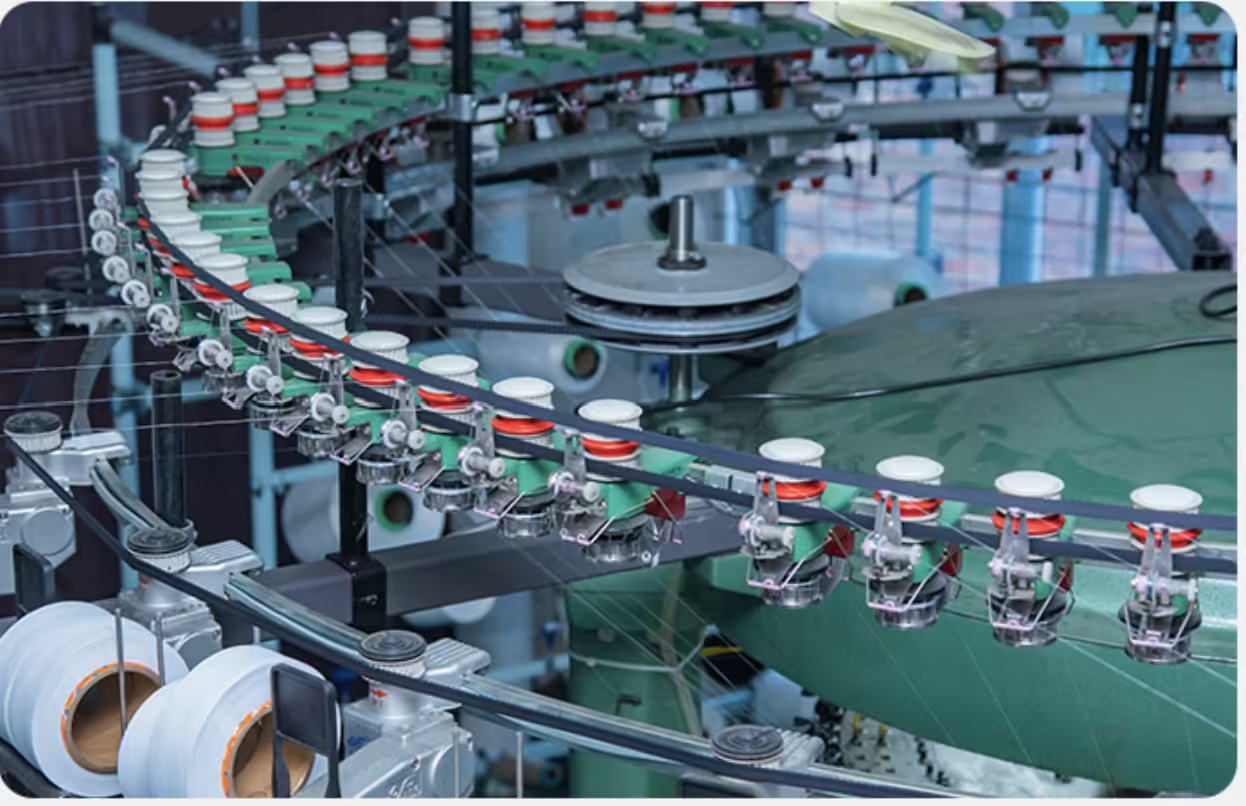
The Role of Smart Textiles
The first time I heard about smart textiles, it seemed like a scene from a sci-fi film. Incredible fabrics now bring change to underwear comfort by adding electronic pieces right into the cloth. Clothes can manage sweat and keep you warm or cool, adjusting to what our body wants. Think about running a marathon with underwear that keeps you dry and cool, lessening irritation - like a personal helper right in your clothing.
A table showcasing the benefits:
| Feature | Benefit |
|---|---|
| Moisture Management | Keeps skin dry and reduces irritation |
| Temperature Control | Adjusts to body heat for comfort |
AI-Driven Design and Production
AI joining design and production feels like opening a door to endless ideas. Smart algorithms look into consumer data, guessing trends and perfecting design details10. Styles change fast and AI lets brands catch up, crafting designs that feel made just for me.
Main Benefits of AI in Manufacturing:
- Trend Prediction: Brands stay ahead by guessing popular styles.
- Personalization: Designs tailored to individual tastes.
Sustainable Manufacturing Practices
Sustainability is more than a trendy term - it's a promise I aim to keep in daily life. I really celebrate the move to eco-friendly ways in underwear production. Methods that cut waste, use recycled materials11, and use eco-friendly dyes match my values and provide choices that fit my eco-friendly lifestyle.
Sustainability Practices:
- Recycling: Fabrics from used materials.
- Energy Efficiency: Use of solar-powered machines.
3D Printing and Customization
3D printing feels like magic, letting us create tailored designs with the press of a button. I love having underwear that fits my body shape perfectly, offering comfort and style without the delay or waste of old methods. It's like having a tailor just for you.
A table outlining customization options:
| Customization Option | Description |
|---|---|
| Bespoke Fits | Tailored to individual body shapes |
| Unique Designs | Personalized patterns and color choices |
These new ideas not only make production faster but connect with our growing wishes for sustainability and personalization. It's a very exciting time for the future of underwear production.
Smart textiles can regulate body temperature.True
Smart textiles adjust to body conditions, enhancing comfort.
AI in underwear design does not personalize products.False
AI customizes designs based on individual preferences.
How Is Sustainability Shaping the Future of Custom Underwear Exports?
Sustainability is not just a trend. It is changing how people think about custom underwear exports. This change inspires brands to develop new ideas. Companies adapt to new expectations. They evolve.
Sustainability in custom underwear exports uses eco-friendly materials. Factories create products in an ethical way. Less harm to the environment is very important. This trend changes industry dynamics. It influences how consumers choose products. It also improves global brand reputations.
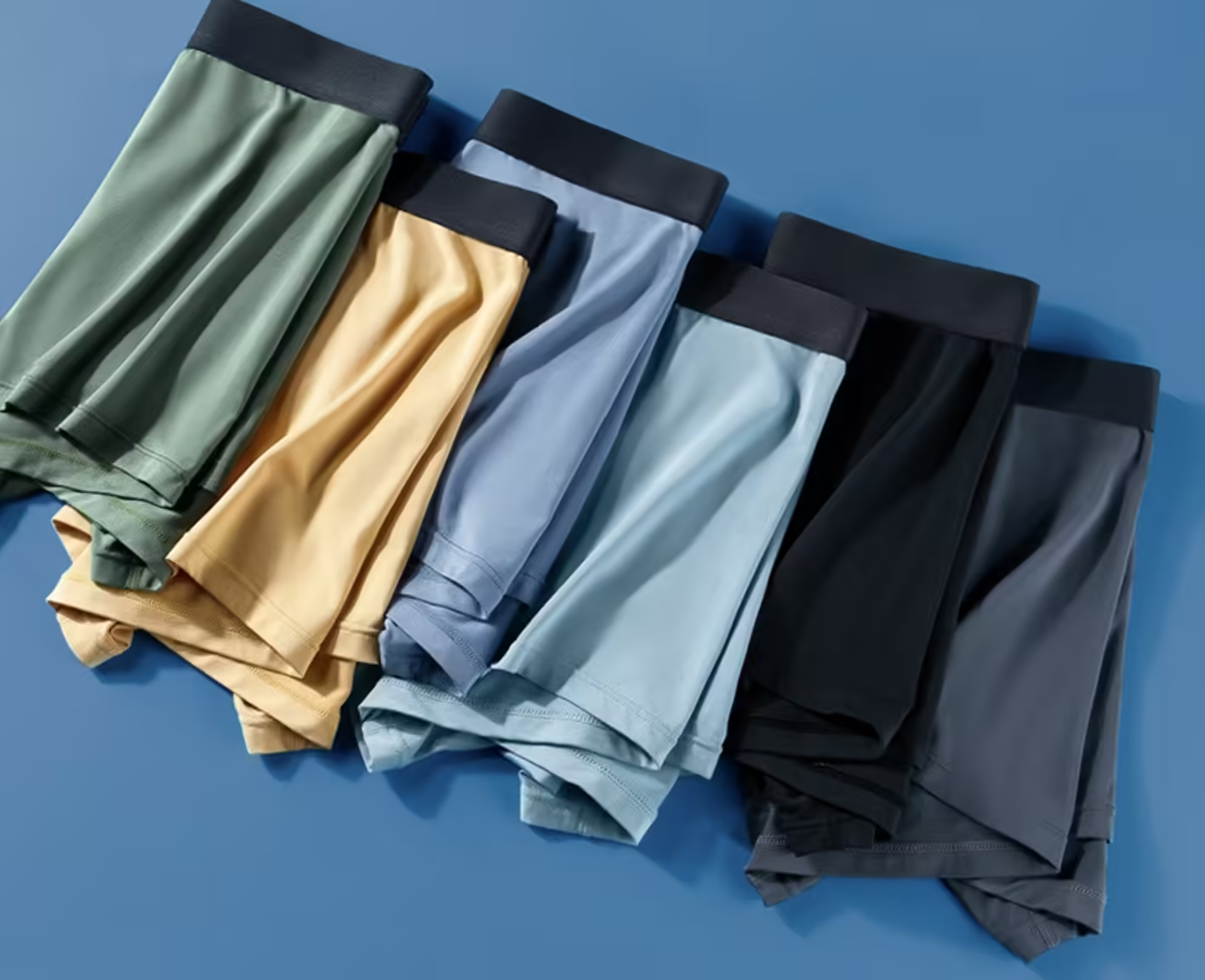
The Rise of Eco-Friendly Materials
I remember the first time I felt the difference between a regular cotton shirt and one made from organic cotton. It was softer and a gentle touch against my skin. Many brands in underwear now use materials like organic cotton, bamboo fibers, and recycled fabrics. These materials not only please people who care about the planet but also cut down on harm to the environment. For example, organic cotton uses much less water than regular cotton. This is important in our world where water is scarce.
Ethical Production Processes
I once visited a small factory dedicated to fair work practices. Workers there were genuinely happy. They knew their rights and got fair pay in safe workplaces. Brands with such practices often win the loyalty of customers who care about social responsibility12. Fair labor and using less waste during production are not just empty words; they are vital for creating a kind business model.
Consumer Demand and Market Dynamics
I once paid more for jeans made in a sustainable way. Many shoppers also focus on sustainability rather than just price. A survey showed many people now think about how their purchases affect the environment.
| Factors | Impact on Consumers |
|---|---|
| Material | Preference for natural fibers |
| Production | Demand for transparency |
| Pricing | Willingness to pay more |
Regulatory Influences
Across the globe, stricter rules are cutting down on carbon footprints in textile production. Exporters are adapting by using sustainable practices. They are not just avoiding penalties; they see new markets that love eco-friendly options.
Innovations in Sustainable Practices
Companies use new technologies to improve production and create less pollution. New dyeing techniques that need less water and energy are now common. Innovative ideas like closed-loop systems13 recycle resources and really minimize waste.
Challenges in Implementing Sustainability
Starting with sustainability is sometimes tough. First costs are high, and new supply chain partnerships are hard to establish. But these challenges get easier with time as sustainable elements can gradually blend into old processes, ensuring a balance between cost-effectiveness14 and environmental responsibility.
Organic cotton uses more water than conventional cotton.False
Organic cotton actually uses less water compared to conventional cotton.
Sustainable practices in underwear production attract loyal customers.True
Brands using ethical and sustainable methods often gain a dedicated consumer base.
Conclusion
China is expected to maintain its dominance in the custom underwear export market by 2025, supported by strong manufacturing capabilities, skilled labor, and competitive pricing.
Discover how China's extensive manufacturing infrastructure supports its dominance in producing custom underwear. ↩
Learn about the skilled labor force that contributes to China's leadership in the custom underwear market. ↩
Understand the factors that allow China to offer competitive pricing for custom underwear production. ↩
Explore how Chinese manufacturers excel in innovative design solutions for custom clothing. ↩
Discover why India's economic growth is drawing attention as an alternative investment destination. ↩
Learn how trade tensions are benefiting Vietnam's manufacturing sector. ↩
Explore Vietnam's policies that attract foreign investments. ↩
Understand Brazil's strategies for leveraging its natural resources. ↩
Access in-depth analyses to inform strategic investment decisions. ↩
Explore how AI is revolutionizing fashion design by optimizing trends and personalizing products. ↩
Learn about the use of recycled materials and eco-friendly dyes in sustainable underwear manufacturing. ↩
Learn how fashion brands incorporate CSR initiatives to improve brand reputation. ↩
Understand how closed-loop systems reduce waste by recycling resources within textile production. ↩
Explore strategies to balance cost with sustainability in fashion manufacturing. ↩




